“For twenty-three days, with one hand I held an umbrella and with the other I cooked…for twenty-three days!” adds Maili Didi, in between adding more fish to — and stirring those already in — the wok, and adding more wood to the fire.
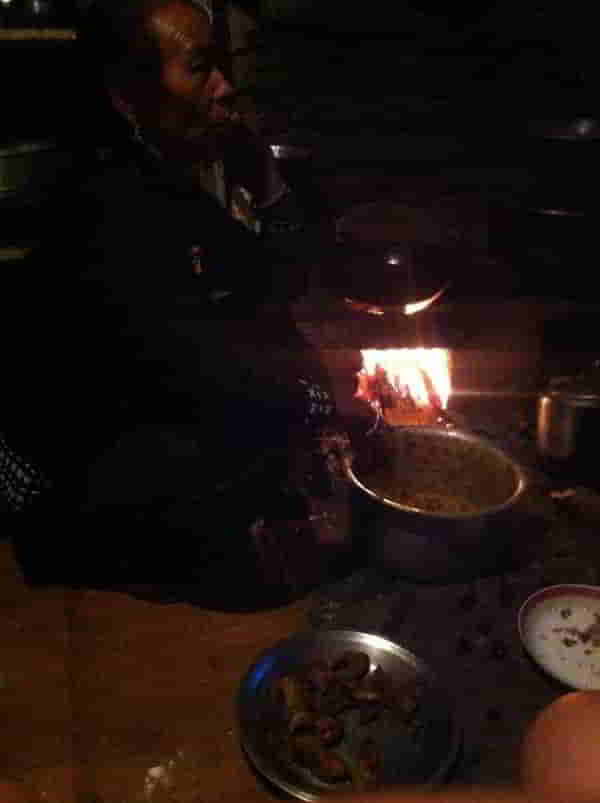
We were in our second evening in Thangpalkot. Not unlike the preceding one, Maili Did was frying the fish COMMITTED team had caught in — and bought from — Raithane School pond. My contribution, at just one small one, had again been abysmal. But, unlike the previous day, having caught almost 4 kg (9 lb) n total, the evening would be a long one.
It had started with us cleaning and chopping the day’s catch. Once we had completed that, along with Bal, our engineer, I had joined Maili Didi in the small kitchen to help as well as to chat with her.
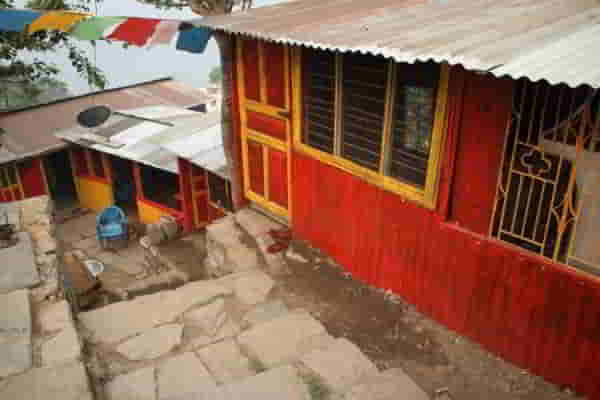
In between mixing the spices and the fish, tasting each batch that came out of the wok, I asked her about the earthquake, life since then, and she about my marital status…like always.
The first time I met her was in my very first visit to Thangpalkot, the summer of 2012. That, obviously, had also been the first time the conversation about my marital status had come up. Most Nepalese don’t think twice about asking about and/or commenting on the marital status of others.
Following our short stay then, I had left with very very fond memories of her, her family, the pristine, quiet and beautiful little village of Thangpalkot and the surrounding area. (See Bound to Kafala for more.)
“Sabbai gayo!” Maili says, describing how she had lost everything in the quake. “We lost all our assets and ornaments.”
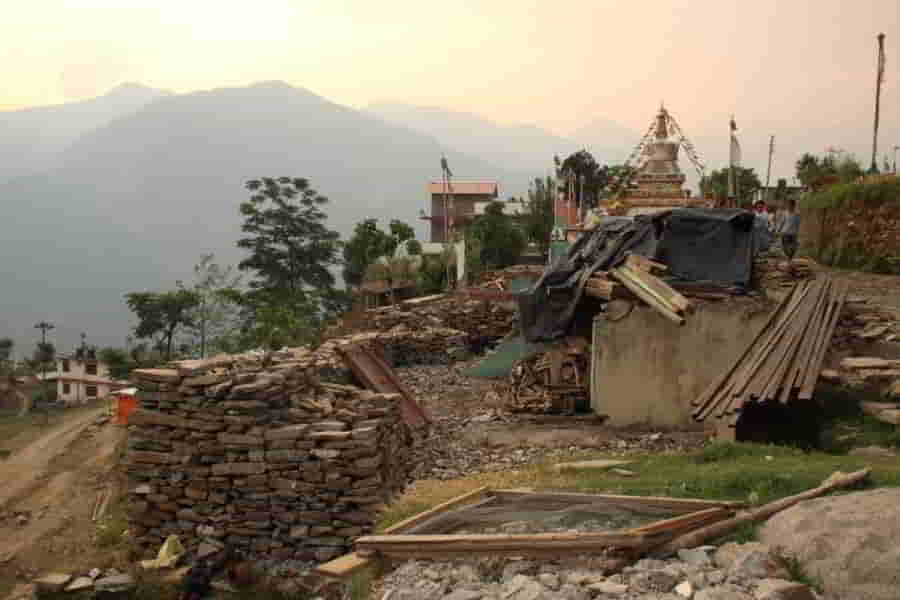
Pointing at 4 traditional bowls on a rack in the kitchen, she says, “Those and some gold ornaments were all I was able to salvage.” (In these parts of Nepal as well as where I am also from, a woman’s jewellery is a status symbol.)
She and her family had moved to the current site only about two weeks before. Until then, they had squatted on someone else’s land. After the first quake of April 25, they had suffered through after-shock after after-shock and another major quake on May 12.
It had been around that time that her hands had been full for over three weeks trying to keep herself dry and prepare meals at the same time!
Then, the uncertainty in the stability of the ground under them had been replaced by the uncertainty of their future. The impending monsoon had done nothing to goad the government into action. Winter too had come and gone but the State had made no appearance. All Maili Didi and other victims of the earthquake in Thangpalkot had gotten were their cold fronts.
“Khoi, koi pani sahayog garna ayena.” (“No one came to help.”)
She had heard that the government was providing about Rs. 200K (US$2K) per family. But she knew nothing more.
After almost a year of squatting, the family built the current structures on the side of the hill — a difficult proposition — and had resumed her business. The husband was still working on it. The first day we were there, he fixed the steps you see next to our sleeping quarters in the photo below.
About a month ago, she had been offered a chance to go work in Mumbai as a domestic help. She would have made IRS 20K/month (approximately US$300). She had been tempted, apparently, but couldn’t bring herself to. She had a family to look after. There were some practical considerations too.
“I have never left Nepal. I don’t even know where to get a bus ticket!”
Though, a younger sister lives in Delhi and has been there for years. She makes only 6K/month! She had left a long time ago, when still a teenager, married to a man who lived in Delhi. But when their son was born, the couple brought him home to Mane Kharka and left him with Maili.
“Your sister married really young.”
“Yes, not like you who can’t find even one person to marry.”
And she adds, “I bet you have a wife in every country you have been.”
“What makes you say that?”
“Why do you keep disappearing from Nepal then?! And if you really don’t have a wife as yet, you are not going to find one.”
Early marriage of girls in Nepal is a wide-spread practice. In Sindhupalchok, it’s not much different. Almost 3 of 4 married women, according to the 2011 Census Report, had gotten married/married off before 20 (see image below)!
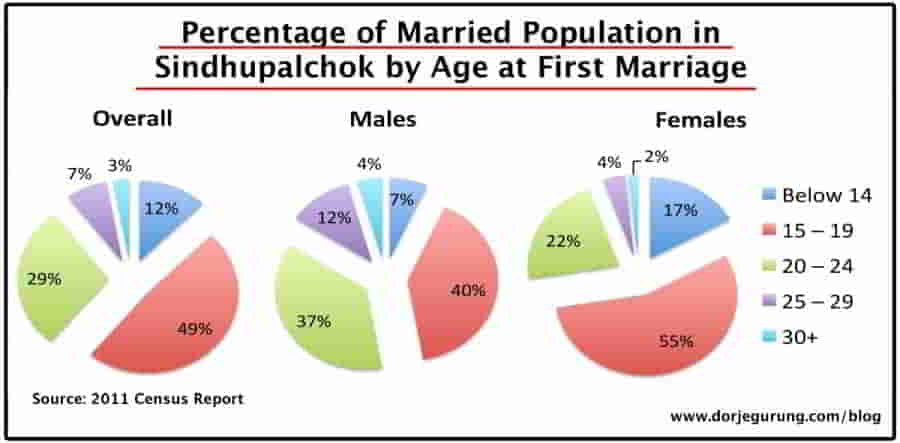 At three-tenth of one percent, the rate of middle-aged men in Nepal getting married on the other hand, is indeed insignificant.
At three-tenth of one percent, the rate of middle-aged men in Nepal getting married on the other hand, is indeed insignificant.
“Kolle hercha aba ta?!” (“Who is going to even eye you?!”) says Maili!
That the chances of the Government of Nepal eyeing the people of Thangpalkot and Sundhupalchok also seemed slim. Somehow they had made it through last monsoon and winter. How would they make it through another one of each again?! Because that, sadly, is what’s in store for them.
The structures Maili and family live in are as basic as they seem. They are made of corrugated iron sheets and wooden planks nailed together. The “room” we slept in, on the second floor in the structure below, had roofs filled with holes. Parts of the windows did not even have panes.
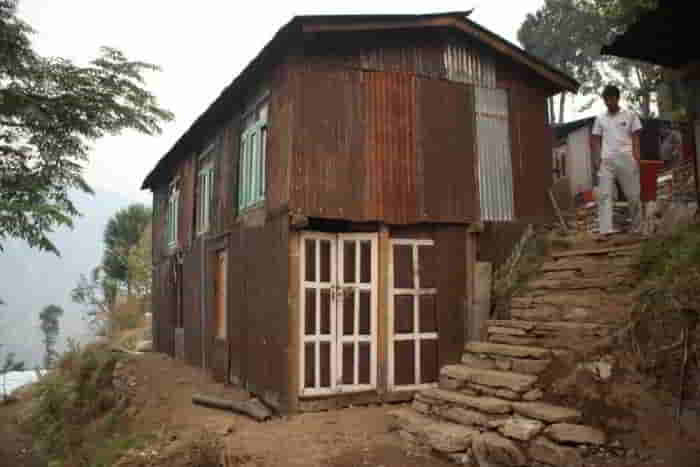
What’s more, this year, they didn’t even have to wait until the monsoon for the heavens to open up and add to their misery. On Tuesday, May 3, the day after we left, they had a massive five-hour hailstorm! Some of the hails, apparently, could have easily weighed 300 g. The storm was so bad that darkness set in at 3 in the afternoon and they had to turn on the lights!
Pretty much all the temporary structures were either flooded through their roofs or just from the deluge on the ground. I doubt Maili’s homes were spared.
Not unlike many others I met, Maili is convinced that the Government of Nepal will not extend any kind of assistance to them, just as she is convinced that no woman would come “to offer to share the rest of their life with you”! She says she is certain that my chances of success at finding a wife are even slimmer than hooking a fish on the Raithane School pond!
And she didn’t fail to add the observation many in Nepal share with me, “A life lived alone, is not much of a life!”
She is certain we are both destined for a future filled with uncertainties, but mostly difficulties, with little hope of succor!
I don’t think it’s just her and me with an uncertain future. Nepal now needs saving from those it was supposed to have been saved by.
What do you think?
